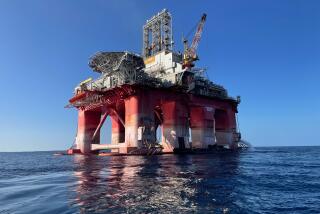Oil Strike off Irish Coast Attracting Multinationals’ Attention : Energy: Surge in interest brings licensing round for offshore blocks. Commercial viability of wells in deep and stormy seas is yet to be proven.
- Share via
DUBLIN, Ireland — Ireland has struck oil. What was once seen as an oilman’s pipe dream may be about to come true off the stormy Irish west coast.
Oil from Irish waters should be drilled, brought ashore and sold for the first time by 1996, Irish exploration company Aran Energy Plc said recently. But no one knows yet whether the oil is economically viable.
“We expect Irish oil ashore by next year,” Aran Chairman Michael Whelan said.
International interest in oil and gas exploration in Irish waters has surged over the past year, culminating two weeks ago in a licensing round for offshore blocks.
The round attracted several multinational companies, with groups including BHP Petroleum Inc., Chevron Exploration Europe Ltd., Total Oil Marine Plc, Statoil UK Ltd., Conoco UK Ltd. and Union Texas Petroleum Ltd. gaining licenses.
Aran was awarded eight of a total of 32 blocks in the Porcupine Basin. Two of them surround its Connemara field, in which oil was discovered in 1979, it said.
The Porcupine Basin is an area 60-150 miles off the west coast of Ireland. Its water depth and stormy seas rule out fixed platforms to drill for oil.
Connemara is the only proven oil accumulation of potentially commercial scale in the area, according to Aran, with proven and probable reserves estimated to be around 200 million barrels.
Exploration ceased in the area in 1986 owing mainly to a slump in world oil prices. But since then technological advances allowing a lower cost base to offset lower prices, as well as slightly improved oil prices, have boosted prospects.
Drilling for oil in deep and stormy Irish waters has been regarded as a nightmare, but it may now be feasible thanks to revolutionary technology, a slash in Irish exploration tax and more flexible forms of financing.
But no one is forecasting a black gold rush.
The oil expected to come ashore next year will come from an extended well test in the Porcupine Basin to see if the find is economically viable in terms of the balance between production costs and the market price of oil.
Aran hopes the test, lasting around 30-40 days, will be successful and lead to development drilling by 1997.
“This will be the first commercial landed oil,” Job Langbroek, exploration analyst at Davy Stockbrokers said in an interview.
Oil has previously been tested offshore, but the only production fields offshore Ireland have so far been for natural gas, at Kinsale in the North Celtic Sea.
“It is a major landmark. . . . The chance of oil being produced is considerably higher than it has been for a long time,” Langbroek said about the developments.
“Nobody has actually attempted to produce oil from that depth in those conditions in the Porcupine so far and it remains to be seen whether the costs work out or not,” Langbroek said.
What will be crucial is the percentage of time an exploration vessel can operate, since a floating or more flexible production system has to be closed down at times, while a fixed system can produce continually, he added.
New technology for deep-sea and horizontal drilling has been pioneered in drilling in the West of Shetland oil field by British Petroleum (BP) with promising results, Aran said, with production costs as low as four dollars a barrel now feasible.
The technology uses a floating ship in deep water anchored on the ocean bed with as many as 15 or 20 pipes called “flexible risers” hanging down from a turret on the ship to the oil well. Machines are sent down to the ocean bed to set up the system.
The outlook also has been improved by a tax cut. Petroleum taxation was cut to 25 percent from 50 percent four years ago, and government royalties over and above that were abolished.
Ireland’s oil infrastructure also is being improved. The government announced last month that the Whiddy oil terminal in Cork, southern Ireland, will be upgraded and recommissioned at a cost of 18 million Irish pounds ($29 million).
Junior minister for enterprise and employment Emmet Stagg said there would now be a base to store and transship any oil find if there was a strike offshore Ireland.
More to Read
Sign up for Essential California
The most important California stories and recommendations in your inbox every morning.
You may occasionally receive promotional content from the Los Angeles Times.













